Gallery of Talking Boards
Page One
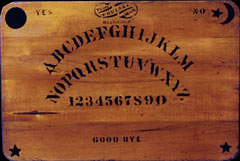
|
OUIJA Kennard Novelty Company Design on wood 1891 This is one of the Ouija boards that started it all from Kennard Novelty Company. It was assembled of five separate boards joined side by side and braced by two vertical slats on the back. Stamped on the reverse side is the patent date: Feb 10th 1891. View a larger image. |
|
OUIJA William Fuld Design on wood 1902 William Fuld's first Ouija board was almost a carbon copy of the Kennard design. Fuld experimented with different types of plywood to make the boards stronger and to resist warping. This one has a a rich bird's eye maple veneer. |
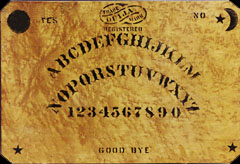
|
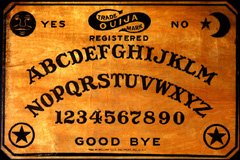
|
OUIJA William Fuld Design on wood 1917 This board is from William Fuld's North Central Avenue factory in Baltimore, MD. A large and a small version were available. |
|
MAGIC MARVEL Lee Industries Design on cardboard 1940's When you tired of consulting the spirits, you could flip the board over and use the Master Play Board on the back. Listed in large print are all the other fun things you can do: chess, checkers, solitaire, letter writing, and of all things Gin Rummy! |
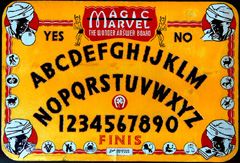
|
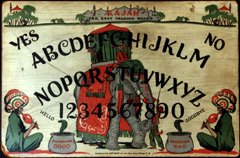
|
RAJAH Gift Craft Design on paper-hardboard 1940's Snake charmers, elephants, what more could you ask of a talking board? Gift Craft made several different talking boards. |
|
MYSTIC TRAY Haskelite Manufacturing Design on paper-wood 1940's Serve "spirits" on this beautiful Haskelite Tray. What would your guests think? In the lower left corner is the Old Hag from Walt Disney's Snow White. Now you know why they called Ouijas witchboards. |
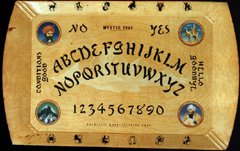
|
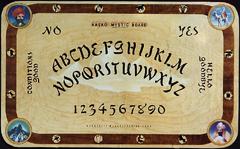
|
HASKO MYSTIC BOARD Haskelite Manufacturing Design on paper-wood 1940's This is a classic Haskelite talking board. Behind the letter design is a white image of the Sphinx with three pyramids. The zodiac surrounds the board in a special "inlaid" wood border. |
|
MYSTIC BOARD Haskelite Manufacturing Design on paper-wood 1940's This is easily one of the most beautiful talking boards ever made. Notice the lavish Egyptian scene right out of a Hollywood movie. A Mystic Prophet planchette completeted the set. |
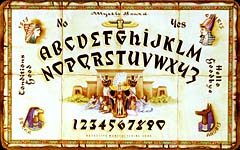
|
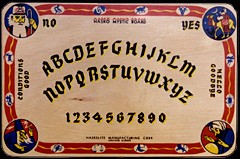
|
HASKO MYSTIC BOARD Haskelite Manufacturing Design on wood 1940's If you couldn't afford the Egyptian Mystic Board above, there was always this less expensive talking board from Haskelite. It came in several different sizes and color variations. |
|
OUIJA William Fuld Design on paper-hardboard 1940s This Ouija design, first introduced in 1944 by William Fuld, was the standard for all Parker Brothers Ouija boards until 1999. The wood planchette was changed to plastic in 1946 |
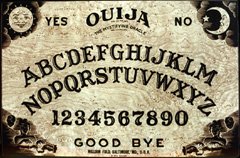
|
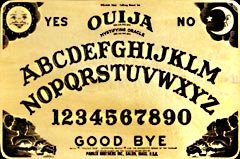
|
OUIJA Parker Brothers Deluxe Wooden Edition Design on wood 1967 Parker Brothers made three boards in the late 1960's. The standard edition was similar to the board sold up until 1999. A second larger edition allowed two people to operate the Ouija more comfortably. The third edition was this special Deluxe Wooden Edition with its lovely golden finish. It came with a wood planchette. |
|
"WIRELESS=MESSENGER" WM. W. Wheeler Company Design on paper-wood 1916 The instructions on the back of this board were printed in seven different languages so you knew exactly how to use it no matter where you were. Parcel Post direct to you, only $2.00. The WM. W. Wheeler Company also published books on psychic phenomena. |
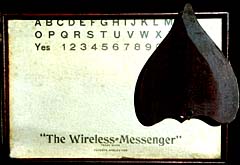
|
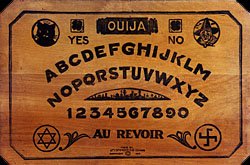
|
OUIJA J.M. Simmons Design on wood 1920 What's this? A Nazi Ouija board? Things seem a bit confused with the Mogen David on one side and the swastika on the other. Prior to World War Two, the swastika was a popular good luck symbol appearing on everything from postcards to lucky coins. There was no connection to the Third Reich whatsoever. |
|
OUIJA J.M. Simmons Design on wood 1939 - 1951 The lucky horseshoe replaced the swastika on this Simmons war time Ouija for obvious reasons. Just so there was no mistake, printed on the back of the board in big letters was "Made In USA." Two other boards were also available. One was a Ouija with a money bag, the other an "Askme" board. |
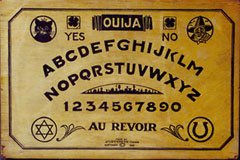
|
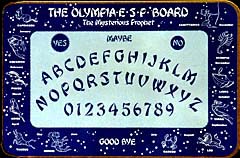
|
THE OLYMPIA ESP BOARD Olympia Specialty Company Design on paper-hardboard 1966 Trouble contacting the Unseen World? Play the special record that comes with this talking board titled appropriately enough "Music To Play E-S-P By." Oh, you need a record player that plays 45s. That won't be a problem, will it? |
|
OUIJA QUEEN American Novelty Company Design on cardboard 1940's This was a pretty, utilitarian design from American Novelty Company. Au Revoir. How many ways can you say good-bye? Be sure to visit our American Novelty Company page for more information. |
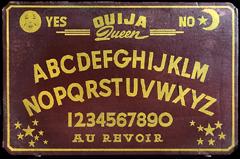
|
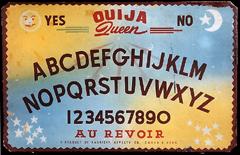
|
OUIJA QUEEN American Novelty Company Design on cardboard 1940's If the brown Ouija Queen was too plain for your tastes, there was always this colorful blue and yellow one. A variant of this board with white across the center was also available. |
|
THE MYSTERIOUS
PLANCHETTE The Planchette Company Design on hardboard 1944 The poor sitter seems to be getting some very bad news from the Swami on this weird and unusual talking board. If the evil specter in the upper right hand corner didn't keep you from using this board, nothing would. |
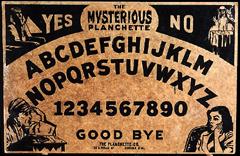
|
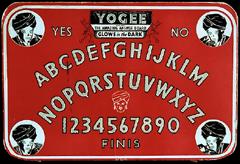
|
YOGEE Lee Industries Design on cardboard 1940's It glows in the dark! Turn out the lights, grab a partner, no candles required. They didn't come any more lurid than this. Absolutely guaranteed to bring two people closer together. |
|
SWAMI Gift Craft Design on paper-hardboard 1940's This is one of Gift Craft's better efforts capitalizing on the mystery and magic of the Far East. You may see an earlier version of this board from National Novelties. |
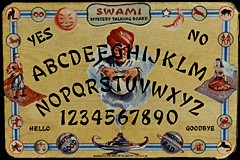
|
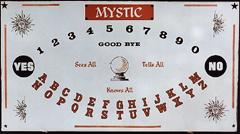
|
MYSTIC Baron, Rott & Samuels Design on paper-hardboard 1950's It was advertised as the mystifying board that sees all, knows all, and tells all. What do you think it would tell you? |
|
OUIJA William Fuld Design on wood 1911 Early Fuld Ouijas lacked the face in the full moon (later to become a sun) in the upper left hand corner of the board. The over sized planchette for this board had legs over two inches long. |
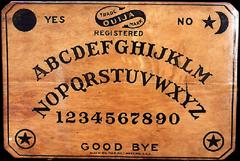
|
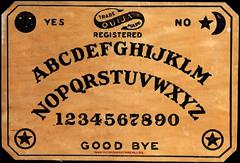
|
OUIJA William Fuld Design on wood 1920's The copyright date 1919, and the Harford Street, Baltimore address on the back identify this as a 1920's board. Big red letters on the back advertised the name WILLIAM FULD BALTIMORE, MD. He didn't want there to be any mistake about who invented the Ouija. |
|
I-D-O
PSY-CHO-I-D-E-O-GRAPH Theodore H. White Design on cardboard 1919 Why stick to numbers and letters when you can add sixty other symbols as well? Maybe your Medimestic Indian Guide (see tepee, upper left corner) can tell you. A picture is worth a thousand words. Isn't it? |
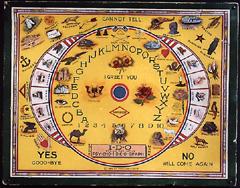
|
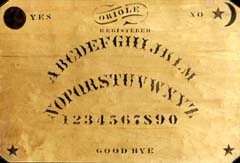
|
ORIOLE Southern Toy Company Design on wood 1905 This early Isaac Fuld board was identical to William Fuld's Ouija except for the name "Oriole" and the Southern Toy Company sticker on the back. |
|
MYSTIFYING ORACLE William Fuld Design on wood 1920's What's in a name? Ask me again and I'll tell you the same. The Mystifying Oracle was a Ouija in every sense of the word except for the name and the cheaper price. This is a beautiful honey blonde bird's eye maple board circa 1920. |
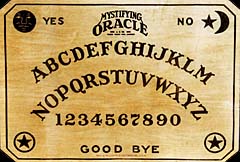
|
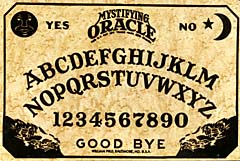
|
MYSTIFYING ORACLE William Fuld Design on paper-hardboard 1940's Notice the evolution of the Ouija/Mystifying Oracle design in this interesting board from the 1940's. A beautiful Maple version in a larger size was also available. |
|
Espirito W.S. Reed Toy Company Design on wood 1892 Following quickly on the success of the Ouija board was this Espirito board from W.S. Reed Toy Company. Unfortunately, the board only lasted a year. "We could not compete with the widely-known and wonderful Ouija." Reed said, by way of explanation. |
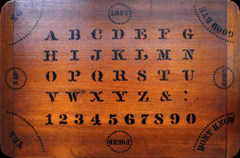
|
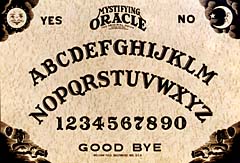
|
MYSTIFYING ORACLE William Fuld Design on paper-hardboard 1940's This is the last of the large and heavy hardboard Mystifying Oracles. It measured fifteen by twenty two inches, was a quarter of an inch thick, and weighed nearly two and one-half pounds. |
|
WIZARD Fortune Industries Design on paper-hardboard 1940's Fortune Industries had the same street address ( 666 Lakeshore Drive, Chicago Il) as Gift Craft, maker of the popular Swami and Rajah talking boards. Hmm . . . wonder if that's how all those possession stories got started? |
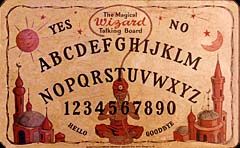
|
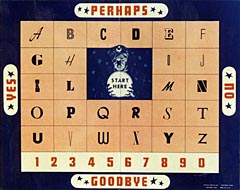
|
MAGI-BOARD Psychic Graf Company Inc. Design on cardboard 1943 The planchette for the Magi-Board was a wooden cross that resembled a Christmas tree stand with a large bullet shaped center pointer. Sitters had to balance this contraption on their fingertips and hope for the best. Although it sounds strange, it actually worked quite nicely. |
|
GUIDING STAR BOARD Palmer and Associates Design on paper-hardboard Talking board design often reflects trends in popular mysticism. The age of this Guiding Star Board is unknown. It could be from the 1940's to the 1960's. The instructions promised that the board would be "under the influence of your own guiding star." |
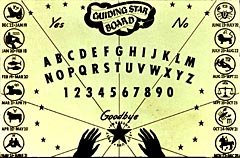
|
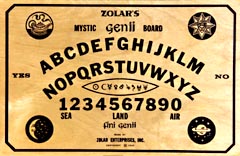
|
MYSTIC GENII BOARD Zolar Enterprises, Inc. Design on wood 1965 The Mystic Genii Board could probably be described as the "better mouse trap" of talking boards. Not only was it a conventional talking board, but the planchette could be converted by the simple attachment of a special ball point pen cartridge into a stand alone message writer. |
|
TALKING BOARD A Barrel of Fun Design on hardboard Why worry about product liability? This manufacturer must have had a good reason for not printing any information on the packaging. They also made the We-ja Girl and Crystal Gazer. |
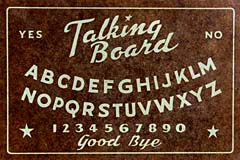
|
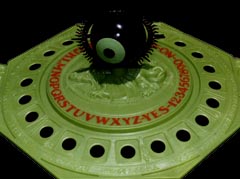
|
ka-bala Transogram Company Inc. Design in plastic 1967 PAX, SAX, SARAX, HOLA, NOA, NOSTRA! What strange chant is that? Could this weird glow-in-the-dark contraption actually foretell the future? Find out the answers to these questions and more on our special ka-bala page. |
|
ZIRIYA Ziriya Creative Arts Associates Design on paper-hardboard 1972 At a loss for words? Then this is the one for you. Few boards capture the imagination like the Ziriya Message Board. Maybe it's the design, the color scheme, or the claim printed right on the board that: Ziriya will be what you want it to be. View a larger image then judge for yourself. |
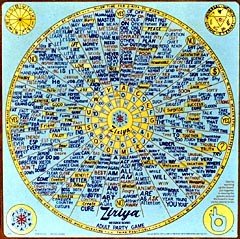
|
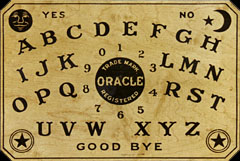
|
ORACLE William Fuld Design on wood 1915 Patented January 19, 1915 William Fuld's first "Oracle" was a complete departure from his regular Ouija. Fuld designed and produced a number of oddball talking boards. Few survive today. |
|
MYSTIFYING ORACLE William Fuld Design on wood 1920 By 1920, the Oracle became the "Mystifying Oracle" as evidenced by the name change in the center black circle. Although the peculiar letter design was interesting, it was not to last. |
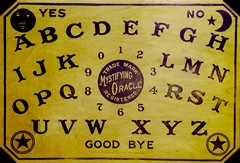
|
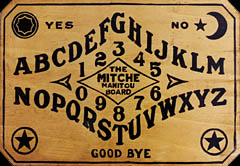
|
MITCHE MANITOU Wilder Manufacturing Company Design on wood 1920's This is obviously a Fuld clone circa 1920 but at least it has an interesting and user friendly letter and number design. As everyone knows, Mitche Manitou is the Native American (Algonquin) spirit guide who will answer all your questions. What? You didn't know that? |
|
MITCHE MANITOU Wilder Manufacturing Company Design on wood 1920's The Mitche Manitou came in a variety of styles and sizes. Here is a variation of the above board. Wilder also made a duplicate "Mystic Ouija Board" which we think predates the Mitche Manitou. Wilder may have made the name change with a little persuasion from William Fuld, but that is only a guess. |
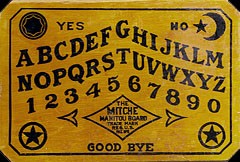
|
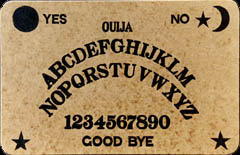
|
OUIJA Copp Clark Publishing Design on hardboard 1950's If you are going to copy a Ouija board, you might as well do it right and start with the original Kennard design. That is exactly what this Canadian manufacturer did after negotiations with the original patentee in 1891. Copp Clark made many Ouijas, some wood, some hardboard, all (except for the packaging and message indicators) exactly alike. |
|
WE-JA GIRL A Barrel of Fun Design on hardboard This unknown manufacturer, marketing as "A Barrel of Fun," made two versions of the We-ja Girl. The first version was this one. The second version had the title and girl in red and yellow like the Crystal Gazer below. |
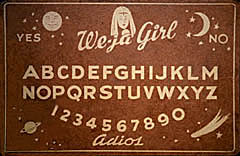
|
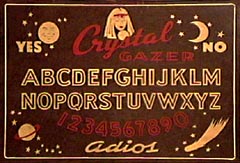
|
CRYSTAL GAZER A Barrel of Fun Design on hardboard The Crystal Gazer brings to four the number of talking boards we have found so far by this unknown manufacturer. You might call this one the new and improved deluxe We-ja Girl. |
|
MAGIC MARVEL Lee Industries Design on cardboard 1940's If you were bothered by the garish colors of the original yellow Magic Marvel and red glow in the dark Yogee, you could have the best of both designs in this toned down (but boring) light tan Magic Marvel/Yogee combo. |
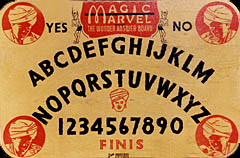
|
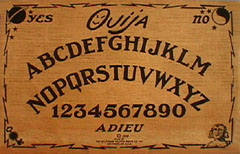
|
OUIJA Baltimore Talking Board Company Design on wood 1920 Collectors call this the "Smiley Face Ouija" for obvious reasons although you may need to look closely to find out why in this picture. There seems to be some debate among experts whether that's George Washington or the Sphinx in the lower right hand corner of the board. |
|
STAR GAZER Alice-Lee Manufacturing Design on paper 1940's This Star Gazer Mystical Question Board was designed as a talking board serving tray. Sandwiched between two pieces of glass is a double sided sheet of paper with the talking board on one side and the "Mysterious Palm," a palmistry/zodiac fortune game, on the other. |
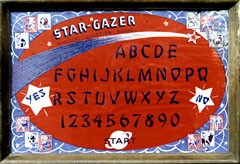
|
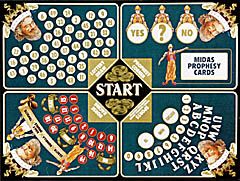
|
MIDAS BOARD 718778 Ontario Limited Design on cardboard 1987 Actually it's the Midas Golden Touch Prophesying Board and if there ever was a game that could pick your winning lottery numbers then this talking board from Canada would be the one to do it. According to the instructions, anyway. It came complete with Midas Prophesy Cards and a plastic message indicator. |
|
FINGER OF FATE Colorforms Design on paper-plastic 1971 About the size of a grapefruit, this forgotten little jem is housed in a clear plastic sphere and uses a magnetic finger pointer suspended from the roof of the ball as a message indicator. Ultra bizarre! Sitters place their fingertips on the rim of the sphere and the pointer takes over, spelling out the messages from the spirits. Bold in concept, the actual contraption leaves a lot to be desired because the finger pointer is so twitchy that it takes forever to spell out a word, much less a full sentence. It gets high marks for originality, though. Oh, and it's very, very cute which is why you see it everywhere on the Internet. You have us to thank for that. You are welcome. |
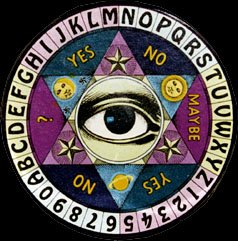
|